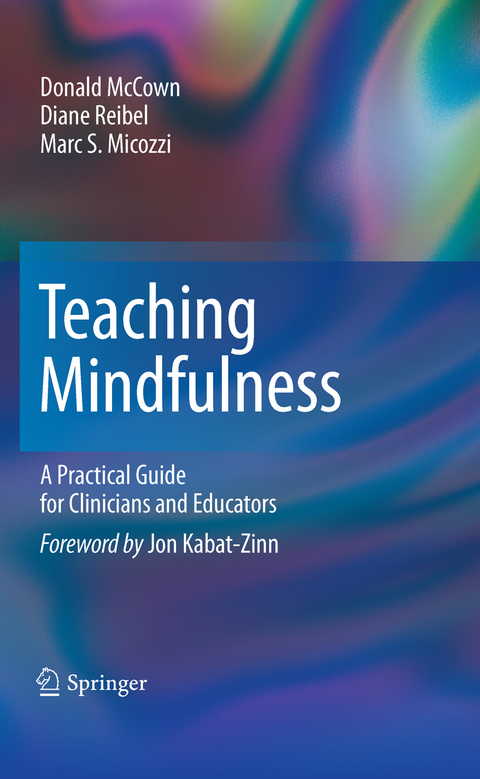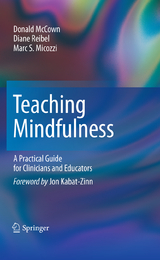Teaching Mindfulness
Springer-Verlag New York Inc.
978-1-4614-0240-4 (ISBN)
The applications and use of mindfulness-based interventions in medicine, mental health care, and education have been expanding as rapidly as the empirical evidence base that is validating and recommending them. This growth has created a powerful demand for professionals who can effectively deliver these interventions, and for the training of new professionals who can enter the fold.
Ironically, while the scientific literature on mindfulness has surged, little attention has been paid to the critical who and how of mindfulness pedagogy. Teaching Mindfulness is the first in-depth treatment of the person and skills of the mindfulness teacher. It is intended as a practical guide to the landscape of teaching, to help those with a new or growing interest in mindfulness-based interventions to develop both the personal authenticity and the practical know-how that can make teaching mindfulness a highly rewarding and effective way of working with others. The detail of theory and praxis it contains can also help seasoned mindfulness practitioners and teachers to articulate and understand more clearly their own pedagogical approaches.
Engagingly written and enriched with vignettes from actual classes and individual sessions, this unique volume:
Places the current mindfulness-based interventions in their cultural and historical context to help clarify language use, and the integration of Eastern and Western spiritual and secular
traditio
ns
Offers a highly relational understanding of mindfulness practice that supports moment-by-moment work with groups and individuals
Provides guidance and materials for a highly experiential exploration of the reader's personal practice, embodiment, and application of mindfulness
Describes in detail the four essential skill sets of the mindfulness teacher
<
Proposes a comprehensive, systematic model of the intentions of teaching mindfulness as they are revealed in the mindfulness-based interventions
Includes sample scripts for a wide range of mindfulness practices, and an extensive resource section for continued personal and career development
Essential for today's practitioners and teachers of mindfulness-based interventions
Teaching Mindfulness: A Practical Guide for Clinicians and Educators brings this increasingly important discipline into clearer focus, opening dialogue for physicians, clinical and health psychologists, clinical social workers, marriage and family therapists, professional counselors, nurses, occupational therapists, physical therapists, pastoral counselors, spiritual directors, life coaches, organizational development professionals, and teachers and professionals in higher education, in short, everyone with an interest in helping others find their way into t
he benefits of the present moment.
Donald McCown, MAMS, MSS, is a lecturer in the School of Health Professions at Thomas Jefferson University. He is Director of Mindfulness at Work Programs at the Mindfulness Institute at the Jefferson-Myrna Brind Center of Integrative Medicine, where he has been developing much of the theoretical and pedagogical material presented in Teaching Mindfulness since 2003, testing and refining ideas and practices with a wide range of populations in a variety of teaching formats. He also teaches MBSR foundation courses and advanced mindfulness courses for the general public, and teaches clinicians to teach mindfulness. A social worker trained at Bryn Mawr College Graduate School of Soial Work and Social Research, he also holds a Master of Applied Meditation Studies degree from Won Institute, has participated in professional training under the direction of Jon Kabat-Zinn, PhD, and has completed the most advanced teacher training at the Center for Mindfulness at University of Massachusetts Medical Center. He maintains a practice in mindfulness-based psychotherapy at the Jefferson-Myrna Brind Center of Integrative Medicine, with particular interest in the use of mindfulness in working with adolescents and adults with developmental disabilities and their families, and with artists and professionals negotiating anxiety and depression in their lives. � Diane Reibel, Ph.D., is the Director of The Mindfulness Institute at the Jefferson-Myrna Brind Center o f In tegrative Medicine. She co-founded the Mindfulness-Based Stress Reduction (MBSR) Program at Jefferson in 1996 and has been teaching MBSR for over 17 years to patients, medical students, college students, and healthcare professionals. She currently runs a Practicum in MBSR for Professionals and offers advanced mindfulness teacher training programs including internships and supervision for professionals integrating mindfulness into their work. Dr. Reibel participated in professionaltraining under the direction of Jon Kabat-Zinn, PhD, and has completed the most advanced teacher training at the Center for Mindfulness at University of Massachusetts Medical Center where she has been awarded MBSR teacher certification. She also holds a joint appointment as Research Associate Professor in the Department of Emergency Medicine and the Department of Molecular Physiology and Biophysics at Jefferson Medical College and studies the effects of mindfulness on physical and psychological health. Her research is published and widely cited in both scientific journals and the popular press. Dr. Reibel brings both a scientific foundation and heartfulness to her work. Marc Micozzi, M.D., Ph.D. is professor of medicine and director of the Policy Institute for Integrative Medicine at Thomas Jefferson University Hospital. He is the past executive director of the College of Physicians of Philadelphia. Prior to joining the College, Dr. Micozzi was the founding director ofthe Na tional Muse um of Health and Medicine and a Distinguished Scientist with the American Registry of Pathology in Washington, D.C. Dr. Micozzi is the author of Fundamentals of Complementary and Alternative Medicine, the first textbook on this subject for physicians and medical students, now in its third edition. He was the founding editor of the Journal of Alternative and Complementary Medicine. Dr. Micozzi has worked to foster communication and cooperation between mainstream and alternative medicine on issues of policy research and education.
Clinical and Cultural Context.- Getting Grounded (In Our Own Instability).- A History Exercise to Locate “Mindfulness” Now.- Defining Mindfulness for the Moment.- Authenticity, Authority, and Friendship.- The Person of the Teacher.- The Skills of the Teacher.- Towards an “Empty” Curriculum.- Organizing the Intentions of Teaching.- Fulfilling the Intentions of Teaching.- Practice Scripts and Descriptions.- Erratum to: Practice Scripts and Descriptions.
| Zusatzinfo | XXVII, 250 p. |
|---|---|
| Verlagsort | New York, NY |
| Sprache | englisch |
| Maße | 155 x 235 mm |
| Themenwelt | Geisteswissenschaften ► Psychologie ► Klinische Psychologie |
| Geisteswissenschaften ► Psychologie ► Sozialpsychologie | |
| Medizinische Fachgebiete ► Chirurgie ► Ästhetische und Plastische Chirurgie | |
| Medizin / Pharmazie ► Medizinische Fachgebiete ► Intensivmedizin | |
| Medizin / Pharmazie ► Naturheilkunde | |
| Medizin / Pharmazie ► Physiotherapie / Ergotherapie ► Rehabilitation | |
| Schlagworte | Achtsamkeit • Adult Development • Alternative medicine • complementary medicine • health benefits of spirituality • institutional religion • medication • Mindfulness • mindfulness-based therapy • Transformative learning |
| ISBN-10 | 1-4614-0240-9 / 1461402409 |
| ISBN-13 | 978-1-4614-0240-4 / 9781461402404 |
| Zustand | Neuware |
| Haben Sie eine Frage zum Produkt? |
aus dem Bereich




